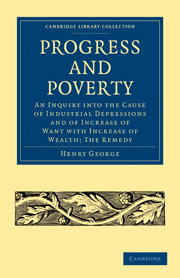 Progress and Poverty
Progress and Poverty Book contents
- Frontmatter
- PREFACE TO FOURTH EDITION
- Contents
- INTRODUCTORY
- BOOK I WAGES AND CAPITAL
- BOOK II POPULATION AND SUBSISTENCE
- BOOK III THE LAWS OF DISTRIBUTION
- BOOK IV EFFECT OF MATERIAL PROGRESS UPON THE DISTRIBUTION OF WEALTH
- BOOK V THE PROBLEM SOLVED
- BOOK VI THE REMEDY
- BOOK VII JUSTICE OF THE REMEDY
- Chapter I Injustice of private property in land
- Chapter II Enslavement of laborers the ultimate result of private property in land
- Chapter III Claim of land owners to compsnsation
- Chapter IV Property in land historically considered
- Chapter V Property in land in the United States
- BOOK VIII APPLICATION OF THE REMEDY
- BOOK IX EFFECTS OF THE REMEDY
- BOOK X THE LAW OF HUMAN PROGRESS
- CONCLUSION
- INDEX
Chapter IV - Property in land historically considered
Published online by Cambridge University Press: 07 September 2011
- Frontmatter
- PREFACE TO FOURTH EDITION
- Contents
- INTRODUCTORY
- BOOK I WAGES AND CAPITAL
- BOOK II POPULATION AND SUBSISTENCE
- BOOK III THE LAWS OF DISTRIBUTION
- BOOK IV EFFECT OF MATERIAL PROGRESS UPON THE DISTRIBUTION OF WEALTH
- BOOK V THE PROBLEM SOLVED
- BOOK VI THE REMEDY
- BOOK VII JUSTICE OF THE REMEDY
- Chapter I Injustice of private property in land
- Chapter II Enslavement of laborers the ultimate result of private property in land
- Chapter III Claim of land owners to compsnsation
- Chapter IV Property in land historically considered
- Chapter V Property in land in the United States
- BOOK VIII APPLICATION OF THE REMEDY
- BOOK IX EFFECTS OF THE REMEDY
- BOOK X THE LAW OF HUMAN PROGRESS
- CONCLUSION
- INDEX
Summary
What more than anything else prevents the realization of the essential injustice of private property in land and stands in the way of a candid consideration of any proposition for abolishing it, is that mental habit which makes anything that has long existed seem natural and necessary.
We are so used to the treatment of land as individual property, it is so thoroughly recognized in our laws, manners, and customs, that the vast majority of people never think of questioning it; but look upon it as necessary to the use of land. They are unable to conceive, or at least it does not enter their heads to conceive, of society as existing or as possible without the reduction of land to private possession. The first step to the cultivation or improvement of land seems to them to get for it a particular owner, and a man's land is looked on by them as fully and as equitably his, to sell, to lease, to give, or to bequeath, as his house, his cattle, his goods, or his furniture. The “sacredness of property” has been preached so constantly and effectively, especially by those “conservators of ancient barbarism,” as Voltaire styled the lawyers, that most people look upon the private ownership of land as the very foundation of civilization, and if the resumption of land as common property is suggested, think of it at first blush either as a chimerical vagary, which never has and never can be realized, or as a proposition to overturn society from its base and bring about a reversion to barbarism.
- Type
- Chapter
- Information
- Progress and PovertyAn Inquiry into the Cause of Industrial Depressions and of Increase of Want with Increase of Wealth; The Remedy, pp. 331 - 345Publisher: Cambridge University PressPrint publication year: 2009First published in: 1881
